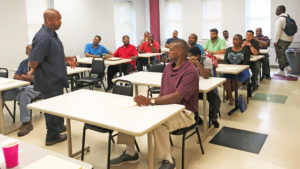A multi-year investment in certification programs by the Urban League is focusing on at least two issues critical to Charlotte’s future — economic mobility, and the creation of skills needed to strengthen the city’s digital infrastructure.
In 2008, The Urban League of Central Carolinas sought funding through Charlotte Works for a fiber optic certification program designed to address several community needs. The certification classes help mobilize people to move beyond minimum-wage jobs and into family-sustaining careers. In addition to strengthening a career path that helps individuals and their families, the classes were conceived to create a positive impact on the local economy and community for generations to come.
“From 2008 until now the program has really grown and developed,” said Maya Norvel, the Urban League of Central Carolinas Director of Marketing and Communications. “Something new this year that we’re really excited about is our corporate advisory councils for fiber. This corporate advisory council is made up of different employers; the employers are members and they are fully entrenched into everything as far as the curriculum, intake, interviewing, and graduations. The employers are involved in the classroom which makes it really beneficial for our clients with placement.”
Corporate advisory councils allow the certification programs to evolve into more dynamic courses. Employer feedback enables clients to be prepared for their future placement and helps the Urban League fine-tune the courses. Norvel said that could mean elongating a certification program in order to include more material, or altering the style of teaching.
Each course and program are offered at no cost to the client. Class sizes average around 20, and the Urban League offers approximately five to six classes each year. Courses vary in length, ranging from four weeks to three months, dependent on the level of credentialing.
National certification programs create new alternatives to support varying populations in the Charlotte workforce, Norvel said. In some situations the certifications offered at the League excel individuals beyond entry levels positions sooner then those who are not certified.
Certificate programs are growing in popularity due to fast-changing job markets, especially in states like Wyoming, South Dakota, Louisiana, Pennsylvania, New York, and North Carolina. In many cases individuals need a variety of non-degree credentials to qualify for a position, or to advance in a career. Some studies indicate that obtaining a certification or license also allows people to earn about one-third more than those without credentials.
 The Urban League can help clients in pursuit of certificates necessary for the entry into specific fields, including preparation for the exam for construction skills and trade, a requirement to become a lineman or line-woman. The fiber optic technician certification is another example required for those who work in a field technology job.
The Urban League can help clients in pursuit of certificates necessary for the entry into specific fields, including preparation for the exam for construction skills and trade, a requirement to become a lineman or line-woman. The fiber optic technician certification is another example required for those who work in a field technology job.
Many certification programs are being modeled as apprenticeships, meaning that classroom activities, as well as hands-on components, fit into a broader apprentice program. This allows for immediate placement on a job by the end of the course.
“At the Urban League, credentialing is extremely important and I believe it is important across Charlotte,” Norvel said. “We were named 50th out of 50 cities in economic and social mobility and it’s really important that we don’t only teach folks how to swim, but make sure that they’re not thrown into shark-infested waters. That’s something that allows for the employers to have buy-in and for those of us that are service providers to have a little bit of a guarantee that we’re teaching in the classroom is conducive to what our clients will need on the job.”
For a complete downloadable version of the offerings at Urban League of Central Carolinas, click here.
